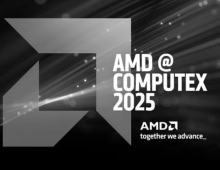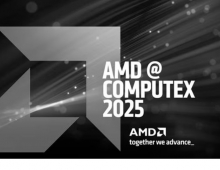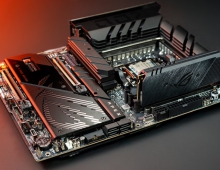
AMD Radeon Open Compute Platform 1.3 Released At SC2016
The annual ACM/IEEE sponsored supercomputing conference (SC16) kicked off today in the United States and AMD is both updating participants on the current state of Boltzmann Initiative, along with providing the latest software update to the project. AMD's Boltzmann Initiative is a plan to overhaul its HPC software stack for GPUs and create an ecosystem that could rival and even interact with Nvidia's CUDA.
At SC16 AMD announced a new release of Radeon Open Compute Platform (ROCm) featuring software support of new Radeon GPU hardware, new math libraries, and a foundation of modern programming languages, designed to speed development of high-performance, energy-efficient heterogeneous computing systems. AMD also announced planned support of OpenCL and for a wide range of CPUs in upcoming releases of ROCm, including support for AMD's upcoming "Zen"-based CPUs, Cavium ThunderX CPUs, and IBM Power 8 CPUs.
The new release of ROCm introduces updates, including:
- Expanded GPU support – ROCm now supports all Polaris architecture-based graphics products, including the Radeon RX 460, 470 and 480 graphics cards, and the Radeon Pro WX 7100, 5100 and 4100 GPUs.
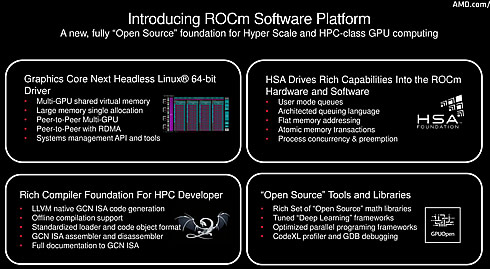
- ROCm Virtualization of the GPU hardware via OS Containers and Linux's Kernel Virtual Machine (KVM) - ROCm now supports Docker containerization, allowing end-users to simplify the deployment of an application in ROCm-enabled Linux server environments. ROCm also supports GPU Hardware Virtualization via KVM pass-through to allow the benefits of hardware-accelerated GPU computing in virtualized solutions.

- Heterogeneous Compute Compiler (HCC) – HCC is a single source ISO C++ 11/14 compiler for both CPU and GPU, with support for the C++17 "Parallel Standard Template Library". It is built on a rich compiler infrastructure including LLVM-based GCN ISA code generation with assembler and disassembler support.
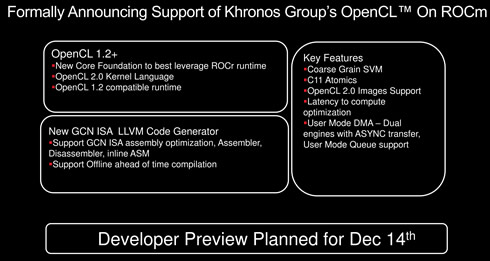
- Heterogeneous-Compute Interface for Portability (HIP) – HIP enables developers to port CUDA applications to ROCm using HIPIFY which automates the conversion to the HIP kernel language and runtime API, creating portable applications that can run on virtually any GPU using either NVIDIA's CUDA Compiler or HCC.
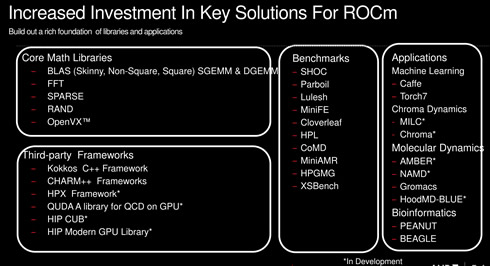
- New Math Acceleration Libraries – ROCm introduces support for new advanced math acceleration libraries with support for BLAS, FFT and N-dimensional tensor contractions.
In addition to today's release of ROCm, AMD also announced that it is working to expand the ROCm ecosystem through increased server CPU support, and planned support of OpenCL. Upcoming releases of ROCm are expected to support AMD "Zen"-based x86 CPUs, ARM AArch64 CPU architecture starting with Cavium ThunderX processors, as well as IBM Power 8 CPUs and servers. OpenCL is being built on a ROCm runtime and compiler foundation which give much greater low-level control of the GPU via its direct-to-metal access.
The new version of Radeon Open Compute is available now at https://github.com/RadeonOpenCompute/ROCm.
At SC16 in booth 1431, AMD will showcase:
- ROCm Technology Cluster running Machine Learning Code on Supermicro servers
- Porting the CUDA application Caffe via HIP Porting Tool
- Ray-tracing and VR visualization for HPC with AMD FirePro S9300 X2 & Radeon R9 Nano GPUs
- OpenMP 4.5 Interoperability targeting multiple GPUs & platforms
- IBM Power8 server with AMD FirePro S9170 Server GPU running ROCm
- Penguin Computing Tundra Extreme ARMv8 ThunderX based server with Radeon™ RX 460 running ROCm
- In-situ rendering with Headless OpenGL/EGL Interop OpenCL on ROCm






